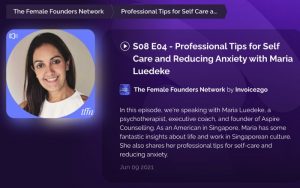Understand emotions, develop empathy for others and improve your emotional quotient for happier living
Text: Maria Luedeke
Emotions can be pesky things. We all have them, and the ability to express and manage how we’re feeling is essential to get us through life. Equally as important though, are the skills to understand, interpret, and respond to the emotions of others. How well you can do this is down to your own personal emotional intelligence (EI) — also known as emotional quotient (EQ).
Consider a world in which you can’t grasp when a friend is feeling fed up, a work colleague is at breaking point, or someone you love just really needs a hug. If you struggle to understand emotions of others, it makes life for all involved a little awkward. “EI means that you have awareness and control of your own emotions and the ability to discern others emotions,” explains Maria Luedeke, Director, Psychotherapist, Counsellor and Executive Coach at Aspire Counselling Pte Ltd. “The big difference between intelligence quotient (IQ) and EQ is that IQ is generally agreed to be fixed and unchangeable whereas EQ is something which can be learned and improved upon.”
The positive news is, it often takes discomfort to create change, and as there is more discomfort in people’s lives as a result of a low EI, those who suffer are more likely to seek help to improve things. And there’s no time like the present. Says Maria; “With global lockdowns and isolation there has been more time than ever before to look inwards and be reflective. More people are seeking help from mental health professionals, so hopefully one of the silver linings of this past year will be greater awareness for emotional intelligence and the areas it encompasses.”
Here, Maria shares more with The Soothe about EI and how to improve on it.
What are the hallmarks of EI and why is it so important, especially during hard times?
There are five main components of EI:
-
Being aware of your emotions
-
Being able to regulate your emotions
-
Having awareness of others emotions
-
Having the ability to create and sustain generative relationships
-
Being able to motivate yourself
Once you look at these components, it becomes clear why it’s so important in all life domains. A lack of EI in life hinders interpersonal relationships on all levels. People who lack empathy (#3) and are unable to regulate emotions to create and sustain positive relationships and that becomes a barrier to connection — one of our base needs as humans.
Have you noticed an increase or decrease in EI over the past tough year?
As with all mental wellness issues, the pandemic has exacerbated what already existed. People who were having a little trouble with anxiety are struggling with higher levels of anxiety, people who had problems in their relationships/marriages are now finding the problems magnified, and those trying to regulate and identify their emotions and others emotions are finding it harder than ever.
How do you spot in others or yourself if you have low EI?
Taking the time to look at your relationship with yourself and with others is a good place to start when evaluating your EI. Of course, there are “fun” online assessments and clinical assessments which should be conducted by a trained mental health professional that can assist in evaluating EQ too.
Can the level vary throughout your life, and if so, why?
People overall usually have a baseline EQ and life factors (divorce, marriage, birth of a child, job changes, etc) can all have an impact on our ability to identify our emotions, regulate our emotions, offer/feel empathy and motivate ourselves. It’s human nature that the more distracted we are with things in our own lives the less we notice others and the less we may notice and/or avoid our own emotions. Therefore, emotional quotient is something that CAN be learned as a social skill and improved upon, so it can and does vary throughout your life.
Is it possible to build EI if you have close to zero?
There are some individuals who may struggle to improve their emotional intelligence due to underlying issues such as Autism, personality disorders or intellectual delays/impairments. Other than that, it should be possible and probable to be able to improve your EQ across the board if that is something you are committed to doing. Just like anything else, it takes practice, conscious effort and consistency before it becomes intuitive.
Could having zero empathy lead to question if an individual is a narcissist or sociopath?
Yes. The Diagnostic and Statistical Manual of Mental Disorders (DSM-V) uses the term Antisocial Personality Disorder to describe “sociopath” and one of the key criteria is “Callousness: Lack of concern for feelings or problems of others; lack of guilt or remorse about the negative or harmful effects of one’s actions on others; aggression; sadism.” That said, there are numerous other criteria that must also be met for someone to be diagnosed with the disorder.
Is it ever possible to develop empathy?
Trying to view life through other people’s perspectives is a great way to begin to develop empathy; it allows you to understand those around you a bit more and to connect to their way of thinking and feeling. People who have high EQ are usually able to focus more on long-term success rather than immediate gratification and this translates into sustained motivation, productivity and success.
What ways can someone invest in building their emotional intelligence?
Reflection and observation are key to improving emotional quotient. Self-reflection in regards to how you react to others’ emotions, how you control your own emotions, and your ability to stop and think before acting. Observe how you respond to others in stressful situations as well as what happens to your own emotions.
Step one really is to stop, breathe and create awareness around what you are thinking, doing, emoting and experiencing physiologically. This then will translate into greater self-awareness and from there you can begin to focus on external interpersonal awareness in relationships.
If you’d like to find out more about EQ, or want to speak to a mental health professional for help with emotional intelligence related issues, read our feature on counsellors, psychologists, psychiatrists and life coaches who will be able to provide advice and support.





